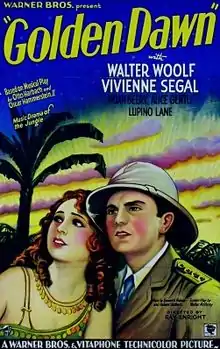Golden Dawn (film)
Golden Dawn is a 1930 American pre-Code musical operetta film released by Warner Bros., photographed entirely in Technicolor, and starring Vivienne Segal, Walter Woolf King and Noah Beery. The film is based on the semi-hit 1927 stage musical of the same name (music composed by Emmerich Kálmán and Herbert Stothart, book and lyrics by Oscar Hammerstein II and Otto Harbach.)
| Golden Dawn | |
|---|---|
 | |
| Directed by | Ray Enright |
| Written by | Walter Anthony |
| Based on | the operetta by Oscar Hammerstein II and Otto A. Harbach. |
| Starring | Walter Woolf King Vivienne Segal Alice Gentle Noah Beery, Sr. |
| Music by | Herbert Stothart Emmerich Kálmán Rex Dunn Robert Stolz |
| Cinematography | Frank B. Good Dev Jennings (Technicolor) |
Production company | |
| Distributed by | Warner Bros. |
Release date |
|
Running time | 83 minutes |
| Country | United States |
| Language | English |
Plot
The story takes place in colonial Africa, where Dawn is a white girl, kidnapped in infancy and is being brought up by a black native, Mooda, who runs a canteen in the now German colonial settlement. Dawn falls in love with a British rubber planter, Tom Allen, who is now a prisoner of war. The native black leader of the tribes in that region is also in love with Dawn and becomes extremely jealous when he hears of Dawn's love for Allen, who, in turn, is sent back to Britain by the Germans for attempting to steal Dawn, whom they believe is half black.
Eventually, the British regain control of the territory and drive out the Germans. Allen returns to the colony. When the settlement experiences a drought, the local tribal leader attempts to incite the natives against Dawn, claiming God is angry because Dawn has dared to love a white man. Allen is unable to save Dawn because the colonial authorities refuse to act unless they have proof that Dawn is one hundred percent white. Eventually Dawn's "mother" (Mooda) confesses that she is not Dawn's true mother and that Dawn's real mother was white which Dawn's father confirms.
Allen quickly brings British troops just as the natives are about to sacrifice Dawn. During the ceremony however, one of the virgin priestesses reveals that the jealous tribal leader has been lying about Dawn and that God is not interested in Dawn as she is pure white. Furthermore she reveals that the tribal leader had violated her (the priestess's) chastity and claims the true reason for God's anger was this sacrilegious act. The tribal leader is deposed and sacrificed to the anger of the natives and the drought quickly ends as rain pours down. In the end, Dawn and Allen, happily reunited, sail back to England together.
Cast
- Walter Woolf King as Tom Allen
- Vivienne Segal as Dawn
- Noah Beery as Shep Keyes
- Alice Gentle as Mooda
- Dick Henderson as Duke
- Lupino Lane as Mr Pigeon
- Marion Byron as Joanna
- Edward Martindel as Colonel Judson
- Nina Quartero as Dawn's Maid-In-Waiting
- Sōjin Kamiyama as Piper
- Otto Matieson as Captain Eric
- Julanne Johnston as Sister Hedwig
Songs
- "Africa Smiles No More" (Sung by Alice Gentle)
- "The Whip" (Sung by Noah Beery twice)
- "My Bwanna" (Sung by Vivienne Segal and chorus; Reprised by Vivienne Segal)
- "We Two" (Sung by Marion Byron and Dick Henderson)
- "Dawn" (Sung by Walter Woolf King; Reprised by a chorus during finale)
- "Mooda's Song" (Sung by Alice Gentle)
- "My Heart's Love Call" (Sung by Walter Woolf King)
- "It's a Long Way to Tipperary" (Sung by the British exchange prisoners)
- "In a Jungle Bungalow" (Sung by Lupino Lane and chorus; Danced to by Lupino Lane)
- "A Tiger" (Sung and danced to by Marion Byron and Lee Moran; Reprised by Marion Byron)
- "Mulungu Thabu" (Sung by chorus with spoken interjections by Nigel de Brulier)
- "Dawn" (Reprised by chorus)
Production
Beery was the accomplished older brother of actor Wallace Beery and comedian Lupino Lane was the uncle of actress/director Ida Lupino. Noah Beery was widely praised for his deep bass voice after he first sang in Song of the Flame. He recorded the song "The Whip" for Brunswick Records and the recording was issued in their popular ten inch series on record number 4824.
Preservation status
The film survives in a black-and-white copy made in the 1950s by Associated Artists Productions. It is available on DVD from the Warner Archive Collection. One short fragment of an original color print was identified in the British Film Institute archives in 2014.
See also
External links
- Golden Dawn at IMDb